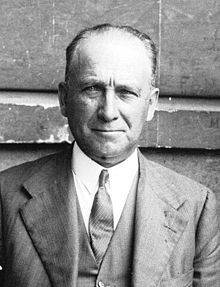
Back Francisco Largo Caballero AN فرانثيسكو لارجو كابييرو Arabic فرانثيسكو لارجو كابييرو ARZ Francisco Largo Caballero AST Франсіска Ларга Кабальера Byelorussian Франсиско Ларго Кабайеро Bulgarian Francisco Largo Caballero Catalan Francisco Largo Caballero German Φρανθίσκο Λάργο Καμπαγιέρο Greek Francisco Largo Caballero Esperanto
You can help expand this article with text translated from the corresponding article in Spanish. (February 2022) Click [show] for important translation instructions.
|
Francisco Largo Caballero | |
|---|---|
 | |
| Prime Minister of Spain | |
| In office 4 September 1936 – 17 May 1937 | |
| President | Manuel Azaña |
| Preceded by | José Giral Pereira |
| Succeeded by | Juan Negrín López |
| Minister of War | |
| In office 4 September 1936 – 17 May 1937 | |
| Prime Minister | Himself |
| Preceded by | Juan Hernández Saravia |
| Succeeded by | Indalecio Prieto |
| President of the Spanish Socialist Workers' Party | |
| In office 12 October 1932 – 1 July 1936 | |
| Preceded by | Remigio Cabello |
| Succeeded by | Ramón González Peña |
| Minister of Labour and Social Security | |
| In office 14 April 1931 – 12 September 1933 | |
| Prime Minister | Manuel Azaña |
| Preceded by | Gabriel Maura Gamazo |
| Succeeded by | Carles Pi i Suner |
| Member of the Congress of Deputies | |
| In office 14 July 1931 – 31 March 1939 | |
| Constituency | Madrid |
| In office 18 May 1918 – 1 June 1919 | |
| Constituency | Barcelona |
| Personal details | |
| Born | 15 October 1869 Madrid, Kingdom of Spain |
| Died | 23 March 1946 (aged 76) Paris, France |
| Political party | PSOE |
| Signature |  |
Francisco Largo Caballero (15 October 1869 – 23 March 1946) was a Spanish politician and trade unionist who served as the prime minister of the Second Spanish Republic during the Spanish Civil War. He was one of the historic leaders of the Spanish Socialist Workers' Party (PSOE) and of the Workers' General Union (UGT). Although he entered politics as a moderate leftist, after the 1933 general election in which the conservative CEDA party won the majority, he took a more radical turn and began to advocate for a socialist revolution.